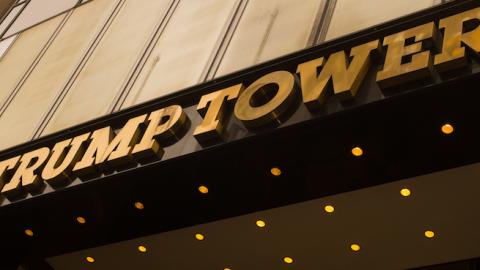The controversy over President Trump and Russia is, at base, a battle between rival conspiracy theories. To hear the president’s enemies tell it, he colluded with Vladimir Putin to get elected. Mr. Trump sees himself as victim of a plot, hatched by Barack Obama, to smear him as Mr. Putin’s Manchurian candidate.
At 6 a.m. on Saturday morning Mr. Trump opened a new round in this fight by claiming on Twitter that “President Obama was tapping my phones in October, just prior to Election!” Many press outlets immediately denounced Mr. Trump’s tweet as baseless. James Clapper, who was Mr. Obama’s last director of national intelligence, seemed to agree: “For the part of the national-security apparatus that I oversaw,” Mr. Clapper told NBC’s Chuck Todd on Sunday, “there was no such wiretap activity mounted against the president, the president-elect at the time, or as a candidate, or against his campaign.”
Mr. Trump’s accusation and Mr. Clapper’s categorical denial can’t both be right—or can they? Mr. Clapper may be staking his position on a legalistic definition of the phrase “mounted against the president.”
What if the NSA was monitoring the calls of close associates of Mr. Trump who were not part of the campaign—people who talked to him regularly? In mid-January both the BBC and McClatchy reported that on Oct. 15 a Foreign Intelligence Surveillance Act court approved an investigation into Russian activities in the U.S. that focused on nameless Trump associates—three of them, according to the BBC. Also in mid-January, the New York Times reported on “a broad investigation into possible links between Russian officials and associates of [Mr.] Trump.”
If we assume that the National Security Agency was indeed tasked, as a result of the Oct. 15 decision or in some other context, with monitoring the phone calls of three Trump associates, then it is easy to build a scenario whereby Mr. Trump’s accusation and Mr. Clapper’s denial are both true.
Who might be the targets of such an investigation? On the basis of publicly available information, let’s speculate: First, Roger Stone, an informal political adviser to Mr. Trump. Second, Michael Cohen, Mr. Trump’s personal lawyer, who in January helped generate a peace plan for Ukraine that the Times depicts as pro-Russian. Third, Mike Flynn, Mr. Trump’s former national security adviser, who in 2015 received money for a speech from the Russian government. All three had some connection with Moscow or its friends, so the idea that they were monitored is at least plausible.
Stipulating that they were, the government would find itself monitoring all of Mr. Trump’s calls with one of his political advisers, his lawyer and his national security adviser. Transcripts of those intercepts would be available to the Obama administration’s senior national-security officials. In this scenario, the tapping of Mr. Trump’s calls would be extensive, but Mr. Clapper’s denial would still be true—at least in a literal sense—because Mr. Trump wasn’t the direct target.
Critics of Mr. Trump have heaped special scorn on his claim that the theorized wiretaps were ordered by Mr. Obama directly. The former president’s spokesman issued a carefully worded statement that “neither President Obama nor any White House official ever ordered surveillance on any U.S. citizen.”
In terms of bureaucratic procedure, the spokesman certainly has a point: The White House never directly generates FISA investigations; that task falls to the Justice Department, to then-Attorney General Loretta Lynch. It strains credulity, however, to believe that Ms. Lynch would have refrained from informing the president if Mr. Trump’s associates were indeed being monitored, since such an investigation risked exposing Mr. Obama to a grave accusation of domestic spying.
How valid is this scenario? At this stage, we simply do not know. Everything hinges on whether the press reports regarding the FISA investigation are true, on who the targets were, and on the scope of the surveillance. The Trump administration has asked Congress to look into the matter, so perhaps we will soon have more-solid information on which to make a judgment.
In any case, we already know more than enough to dismiss the claim that Mr. Trump’s complaints are “baseless.” The NSA’s collection of communications by Trump associates—whether conducted through a FISA investigation or simply as part of routine surveillance of foreign officials—has so far generated no evidence of an alliance between the Trump campaign and the Russian government. It has, however, generated a torrent of leaks fostering the impression of such an alliance.
President Obama took at least one direct step that could not help but deepen that impression. In the final days of his administration, he changed the regulations on the distribution of NSA transcripts, ensuring their wide dissemination across multiple agencies, while minimizing the effort to conceal the identity of American citizens accidentally caught up in the surveillance. Officials justified the step as an effort to protect information about malign Russian behavior from a coverup. That justification alone furthered the notion that Mr. Trump was allied with Mr. Putin, while the change in procedure served up fresh material available to anti-Trump leakers.
The president’s critics treat as outrageous any suggestion that senior officials in the Obama administration tailored NSA surveillance to assist them in their efforts to foil Mr. Trump. They would ask us, instead, to believe an alternative conspiracy theory—that Mr. Trump is Mr. Putin’s puppet. For now, at least, the preponderance of evidence favors Mr. Trump.

















